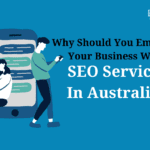Due to a much amount of jargon and acronyms, the Internet marketing sector can be highly unclear at times. This might be frustrating for a business owner. You’ve heard that SEO is “essential,” but many agencies won’t tell you exactly what you’ll be paying for. This article describes how most popular SEO Agencies in Australia work in detail, so you’ll know what to expect in the future.

1. On-page and Off-page SEO
As a side point, SEO firms may use the terms “on-page” and “off-page” SEO interchangeably.
On-page SEO refers to the aspects of your website over which you have direct control, such as linking structures, formatting, and header placement. Link building, outreach, etc., are elements you can’t fully control from your website are all examples of off-page SEO.
There’s a lot of crossover between on-page and off-page SEO work.
2. Technical SEO
Technical SEO is mostly concerned with the structure of your website. It includes features like as:
A clear linking structure
Proper header tag usage
Properly handled 301 redirects
Page load speed
Mobile-friendliness
These are very core components that must be established correctly to develop a solid foundation for your SEO approach. Most of them can be addressed during a preliminary site inspection.
3. Keyword research
The process of determining the ideal search queries to address your organization is known as keyword research.
While it will appear to be a simple task, but a thorough keyword research requires a significant amount of effort. There are several elements that go into determining how “excellent” a keyword is.
When conducting keyword research, excellent SEO Services In Australia consider search traffic, the intensity of competition, and user intent, to name a few factors.
4. Link building/outreach
Among the most time-consuming parts of excellent SEO work is keyword research. As per Google, the website’s backlink profile accounts for a significant percentage of its reputation. In other words, the more high-quality links pointing to your website from elevated websites, the more probably Google and other search engines will promote your pages to their consumers.
5. Content Creation
If lacking content, SEO is useless. Blog submissions, website articles, and complete infographics are all examples of content development. The idea is to develop high-quality material that will be linked to by others, either naturally or through outreach.
Content development is not as simple as it appears. Consistently publishing material that contributes to your website can be difficult, and the entire process is regulated by keyword research and correct technical SEO.
6. Competitor Research
Any strong SEO Plan in Australia should include competitor research.
One of the most useful aspects of Internet marketing is the ease with which you can examine your competitors’ techniques. If anything is working for an opponent in the digital realm, there’s a good possibility you’ll be able to adopt a comparable technique and achieve similar results.
Competitor research includes checking in on competitor websites, in particular, to see what type of content they’re producing and how they’re advertising it, as well as monitoring their backlink profiles to uncover link chances.
7. Prevent Negative SEO
This is where technical SEO and link building collide. Some are good backlinks, and some are harmful backlinks, both of which might harm your site’s rankings.
It’s critical to maintain track of incoming links on your site so that the bad ones can be disallowed through Google or asked to be removed politely by the connecting websites.
Are you searching for top SEO Agencies in Australia?
Now when you have a better understanding of how SEO works, you can start looking for the right company to work with.

Our skilled team of Internet marketers at Knowbility Solutions has years of experience creating tailored SEO strategies for clients across a wide range of sectors. We know what it takes to run a successful SEO strategy, and we’d be delighted to do so for your company.
For further information about our SEO Company in Australia or a free quote, please contact us today!




